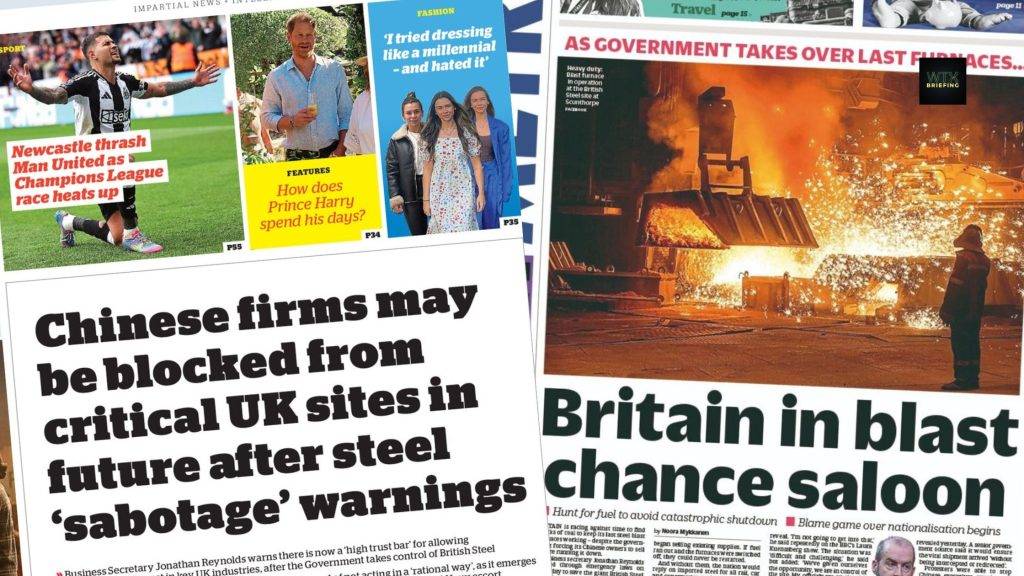The government took the drastic step of taking control of British Steel’s Scunthorpe plant over the weekend after enacting emergency legislation that was rushed through Parliament in a single day.
The business secretary Jonathan Reynolds told MPs that the likely next step would be to nationalise the Scunthorpe plant.
The government say they were forced to seek emergency powers to stop the Chinese owners, Jingype, from shutting down the two blast furnaces, which would have ended primary steel production in the UK.
Since the shocking intervention from the British government, the UK headlines are assessing what could happen next with calls for the plant to be nationalised, rivals looking to buy the plant and fears the Chinese owners are trying to sabotage the site to force Britain to rely on cheap Chinese imports.
UK takes control of British Steel under emergency powers




British Steel might not get enough materials to power Scunthorpe plant
Explainer: This headline is relatively measured, though the phrase “might not get enough materials” introduces an element of uncertainty that could cause concern. While not overtly sensational, it hints at potential economic or industrial instability without providing context or detail, which may lead to undue alarm or speculation.
- Metro reports the government’s “race against time” to obtain sufficient raw materials to keep the blast furnaces running. It comes after ministers accused the plant owners of selling existing materials and not buying more.
British Steel tries to reverse ‘sabotage’ of Scunthorpe furnace
Explainer: This headline uses the term “sabotage,” which is a highly charged word, implying deliberate malice or harm. The choice of language could sensationalise the situation and lead readers to assume intentional wrongdoing without providing evidence or clarification. It risks creating an exaggerated narrative, potentially influencing public perception unfairly.
- The Times reports ministers feared the plant’s Chinese owner, Jingye, planned to “sabotage” the site “to increase British reliance on cheap Chinese imports.” There is alarm over Chinese involvement in other areas of critical infrastructure, such as nuclear power plants, the paper adds.
Chinese firms may be blocked from critical UK sites in future after ‘sabotage‘ warnings
Explainer: This headline uses the term “sabotage” to suggest serious threats from Chinese firms, which could fuel fear and suspicion. The word “may” introduces uncertainty, but it still conveys a sense of impending danger. This framing could sensationalise concerns about foreign influence, leading to a biased, alarmist view without sufficient evidence or context.
- The i says Chinese firms “may be blocked” from critical UK sites following the weekend. The paper says Business Secretary Jonathan Reynolds – who previously said Jingye did not negotiate “in good faith” over the plant’s future – acknowledges there is now a “high trust bar” for allowing such firms to invest in critical British industries.
British Steel to deploy emergency measures to save Scunthorpe furnaces
Explainer: This headline is relatively straightforward but still carries a sense of urgency with the phrase “deploy emergency measures.” While not overtly sensational, it suggests a crisis without explaining the scale or cause, potentially leading to an exaggerated perception of the situation’s severity. It could evoke unnecessary concern without providing full context.
- The Guardian reports British Steel is understood to be looking at offers of help from more than a dozen businesses, including rivals, as it tries to find the raw materials needed to keep its Scunthorpe plant open.


